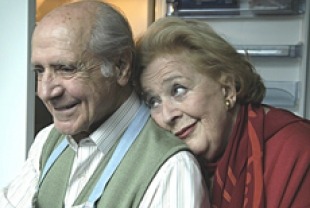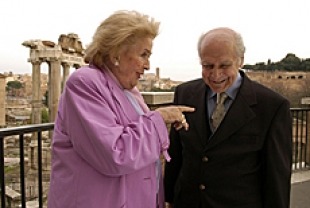Elsa (China Zorrilla) is a widow living alone in a Madrid high-rise but thrilled to be alive even though her body has slowed down quite a bit. Her son has his hands full trying to look after her financial affairs. He is there to offer assistance when she plows into a car parked in front of her building. It turns out to be owned by the high-strung daughter of Fred (Manuel Alexandre), a 78-year-old hypochondriac who takes a lot of pills. He is depressed and still mourning the death of his wife a few months ago. He's just moved into a new apartment across from Elsa's with his dog Napoleon to keep him company. Bearing a check to pay for the damages to his daughter's car, Elsa comes up with a story designed to play upon Fred's kindness. It works. He refuses to take the check and agrees to meet her for a drink.
Elsa sees him as her new project: a repressed man who has lived a boring and safe life without much risk or adventure. She learns that fear rather than love animates him and so she begins to romance him. A dinner out at a fancy restaurant reveals his reserve and fussiness. Elsa surprises him by suggesting that they flee the restaurant without paying their bill. It is the first of many ploys designed to unsettle Fred and to help him develop a fresh perspective on the freedom that comes with old age.
He as a traditionalist is used to basing his actions on old habits and roles assigned by the community. Elsa, on the other hand, loves to be creative with everything she does from the clothing she wears to the stories she tells with flare and large doses of fantasy. That is why she has a special place in her heart for her other son, a wannabe artist with an overblown sense of his own talent. Elsa's influence takes hold of Fred and compels him to rethink a request from his daughter and son-in-law to fund their purchase of a cyber cafe. Fred has a big surprise in mind that has to do with Elsa's identification with Anita Ekberg in Fellini's film La Dolce Vita.
Elsa & Fred, a Spanish film directed by Marcos Carnevale, revolves around an unconventional elder who could be seen as a female Zorba the Greek, who once told his boss "You must undo your belt and live!" Like Jeanne Moreau in The Summer House, China Zorrilla plays a larger-than-life septuagenarian whose zest has an indelible impact on everyone who comes in contact with her. At one point, Elsa says of Fred: "He's 78 and he blushes — how could I not fall in love." It's a delight seeing these two deal with each other's considerable foibles and rough edges as they clash and make-up repeatedly in their romantic dance.
Laughter is the healing balm in this comedy. Fred discovers that a few guffaws are better for him than a handful of pills, helping him unlock the prison of fear and routine where he's been living. For Elsa, laughter is the mark of her humanity and her humility — a connection noted by many spiritual writers.

